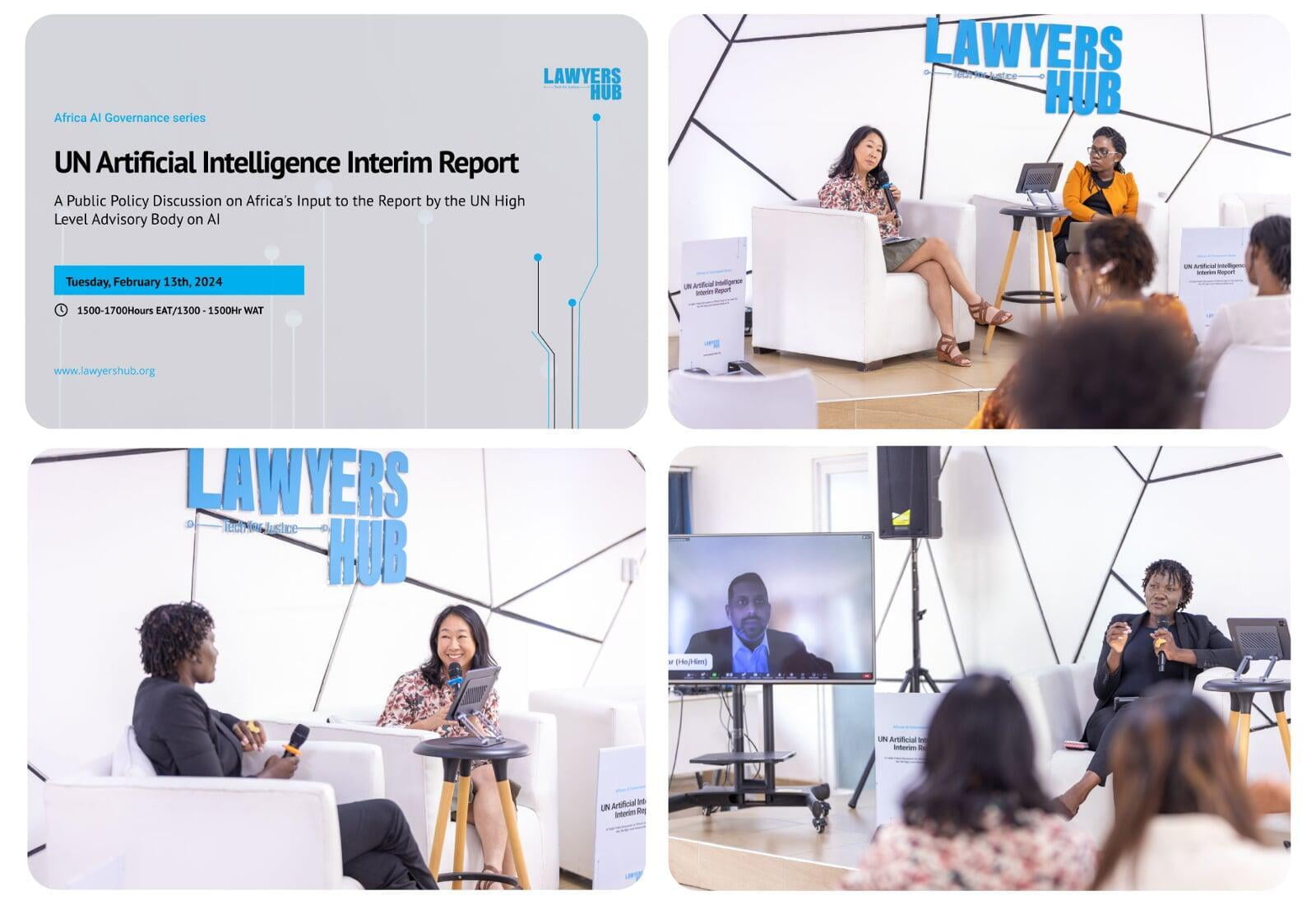
The Lawyers Hub, on February 13, 2024, hosted a public policy discussion on Africa's input to the report by the United Nations high level Advisory Body on Artificial Intelligence. This article aims to provide a snapshot of the discussions and contributions explored during the event, highlighting key outcomes and findings, with a focus on the submissions the Lawyers Hub will make to the United Nations as part of a series of engagements called by the UN for the development of the final report.
The discussion attracted over 500 participants from across the African continent, both online and physically. Speakers included Philip Thiggo, an expert in Technology, Data & Public Policy, Misako Ito from UNESCO, Vilas Dhar from the Patrick J. McGovern Foundation, Risper Onyango, Policy Lead at the Lawyers Hub, and Linda Bonyo, the CEO of Lawyers Hub.
The discussion began with a presentation from the Lawyers Hub, focusing on the AI Landscape and Policy in Africa, along with an Analysis of the Interim Report. This was followed by a session with Philip Thigo, who discussed Strategic Imperatives for Africa: Analyzing Priorities in the Context of Evolving Global AI Governance. Delegates then provided their perspectives, leading to a final discussion between Linda Bonyo, CEO of Lawyers Hub, and Mr. Vilas Dhar on International Frameworks and Global Inclusion: Navigating Pathways to Equality and Cooperation. The session concluded with a Q&A session, allowing participants to ask questions and highlight key issues from the report. As highlighted below;
Presentation by Risper Onyango
The presentation by Risper Onyango, policy lead at the Lawyers Hub, provided a quick analysis of global and continental AI governance policy trends, offering an overview of the Interim Report with a focus on key highlights such as the Global Governance Deficit, AI Opportunities and Enablers, Risks and Challenges, and Preliminary Recommendations of the Report.
The presentation concluded with the Lawyers Hub Observations that included the concept of Inclusive AI in the Global South, emphasizing that technology designed without considering local resources, social norms, and cultural contexts may fail.
It was noted that discussions on inclusion and ethics in AI are predominantly informed by perspectives from the Global North, with limited commitment to addressing historical social and economic injustices. This imbalance carries risks, especially where ethical norms and values in these technologies clash with those of African communities where they are deployed. Additionally, AI-related risks for populations in the Global South were highlighted, including concerns about discrimination, bias, oppression, exclusion, and bad design. The absence of diversity and inclusion has led to flawed AI systems that reinforce existing gender and racial biases.
A comparison was drawn between the stronger safeguards for citizens in Northern countries and the gaps in systems and laws for data privacy in Southern countries. There was an emphasis on the need to build complementary governance initiatives for AI in Africa.
Insights from Philip Thigo
The presentation was followed by a panel session with Mr. Philip Thigo, a member of the UN Secretary-General's Advisory Body on Artificial Intelligence and an Advisor on Data and Open Government at the Office of the President of Kenya. Mr. Philip indicated that the interim body was required to publish the report by December to allow for a longer period of consultations and a series of engagements, which are still ongoing.
He also highlighted that the body was established due to policy fragmentation globally, as many countries are attempting to govern AI independently, resulting in some jurisdictions being left behind. In his submissions, he emphasized that AI is driven by three factors: Compute, Data, and Talent. However, data varies across jurisdictions, so it should be discussed within specific contexts.
He also noted challenges with digital infrastructure, with AI currently consuming 10% of global energy, as well as issues with resource distribution and investments. Additionally, he addressed the lack of representation of Africa's voice in global discussions, stating,
"In this next phase between now and September, the use case that the body is developing is a Kenyan use case that we will use to begin to respond to what the report is suggesting, whether it's principles or guidelines... AI, we realize, is very political. There is a bigger portion of the Geopolitics of AI that the body itself cannot trace, because it's the UN. But then as member states in Africa, we can begin to have that conversation about the Geopolitics of AI, which is what is clouding computers, data, and talent."
Insights from Ms. Misako Ito
In another session, delegate perspectives were presented by Ms. Misako Ito, Regional Director for CI - UNESCO. She highlighted that UNESCO had organized a Global Forum on the changing landscape of AI governance. During the forum, consultations were held on the Interim Report, with 67 UNESCO member states participating, including 10 African countries.
Ms. Ito emphasized that some key issues were raised concerning the report. Firstly, there was a shared concern over the regulatory challenges posed by AI, highlighting the need for an AI governance framework. Secondly, there is a need for collaboration, ethical considerations, inclusivity, and a balanced approach that fosters innovation while protecting human rights. Thirdly, the diversity of perspectives and initiatives highlighted the complexity of AI governance and the importance of international cooperation in shaping the future of AI development and utilization. She noted that most countries are integrating AI into their digital strategies.
Regarding Africa, Ms. Ito indicated that there is a significant discrepancy among African countries in terms of AI readiness. There is a shared concern about national data ownership, the need for capacity building, knowledge transfer, and the importance of moving beyond consumer status. She noted that during the forum, many African countries requested support for capacity building in AI and data governance.
Finally, Ms. Ito mentioned that UNESCO is supporting the African continent by providing African countries with an opportunity to participate in global AI forum conversations. Additionally, UNESCO is conducting regulatory readiness assessments in AI within 15 African countries.
Insights from Mr. Vilas Dhar
Mr. Vilas articulated a compelling argument regarding the then-current discourse surrounding artificial intelligence (AI) and its governance. He highlighted a fundamental imbalance in power dynamics, where private tech companies were perceived as the exclusive creators of technology, leaving the rest of society in the role of mere consumers or targets. Mr. Vilas contended that this narrative must evolve to empower everyone to become creators, not just of AI technologies but also of the broader systems of engagement and power.
In advocating for a democratization of access to technology, Mr. Vilas suggested a shift in focus from inclusion to ensuring that every nation, community, and individual is equipped with the essential tools of digital literacy. This approach, he argued, would enable a more inclusive debate that starts with the people, rather than being reactive to the actions of tech companies.
Central to Mr. Vilas's argument was the notion of setting the agenda in governance discussions. He asserted that individuals and communities should not merely seek a seat at the table but should be empowered to shape the agenda. This, he believed, was crucial for ensuring that governance was about advancing the interests of all stakeholders and providing every person with a voice in the global conversation.
He called for the establishment of basic values and principles to guide the governance of AI. These values, such as dignity, participation, and economic benefit, should be collectively elaborated to inform the governance discourse and ensure that it reflects the diverse needs and perspectives of society.
Mr. Vilas provided insightful commentary on the challenges and opportunities in AI governance, particularly regarding the concept of "red lines" and the broader implications for addressing systemic inequalities. He acknowledged the historical context of colonial practices that had contributed to existing inequalities, highlighting how AI governance presented an opportunity to address these fundamental injustices.
He suggested that the conversation around AI governance extended beyond the technology itself, touching on issues of social justice and systemic inequality. He saw this moment as an opportunity to challenge established power structures and address the systemic injustices that had long been ignored.
Regarding autonomous weapons systems, Mr. Vilas emphasized the urgency of the issue, noting that public opinion was largely against their use without public transparency and control. He argued that while there was a clear moral basis for opposing such systems, the challenge lay in translating this into political action and regulatory frameworks that could effectively respond to the rapid progression of technology.
In conclusion, Mr. Vilas advocated for a proactive approach to AI governance that addressed systemic inequalities, challenged established power structures, and ensured that emerging technologies were used in a way that was ethical and beneficial to society as a whole.
Insights from Linda Bonyo
In the discussion with Mr. Vilas, Linda brought up several crucial points in the AI governance debate. She emphasizes the need to advance the conversation beyond mere inclusion, highlighting the importance of addressing power dynamics that exist between different individuals and regions. Drawing attention to the disparity in resources and opportunities, she noted that while some may have access to advanced education and resources, others in Africa face different challenges, such as limited access to education and job opportunities.
Linda underscored the importance of recognizing and appreciating the differences in context and experiences between regions, emphasizing that the same conversations and solutions may not apply universally.
Regarding cooperation, Linda acknowledged the challenges posed by unequal power dynamics but stresses the need to find ways to collaborate despite these differences. She suggested that understanding and respecting these differences is essential for fostering meaningful cooperation in the AI governance space.
Furthermore, Linda also touched on the concept of "red lines" in AI governance, particularly in relation to autonomous weapons. She noted the potential impact of AI-related conflicts on Africa, highlighting the need for regulations and policies that consider the unique challenges faced by the continent.
Regarding digital lending, Linda noted the challenges posed by American companies using algorithms to provide loans, often leading to debt and exploitation. She underscored the importance of regulating these practices to protect individuals from financial harm. Additionally, she discussed the use of emotional manipulation by betting companies, highlighting the need to address such practices in the context of AI governance.
Her insights highlight the importance of addressing systemic issues in AI governance and advocating for regulations that protect individuals' rights and dignity, particularly in regions like Africa that may face unique challenges and vulnerabilities.
Conclusion
The discussions and contributions during the event underscored key outcomes and findings, with a specific focus on the United Nations Interim Report. These engagements are part of a series called by the UN for the development of the final report, which is ongoing. It is evident that progress is being made in AI governance, and we anticipate that continued engagements and discussions by the Lawyers Hub and other stakeholders will contribute to more responsible AI regulations globally.


